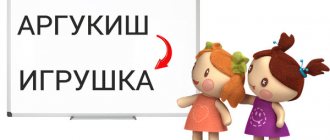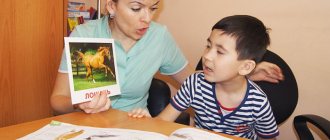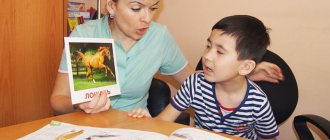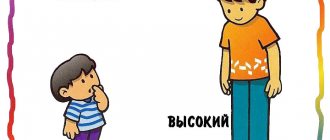Auditory memory is one of the types of figurative memory, thanks to which we capture auditory images, store them and reproduce them.
In preschool age, involuntary memory predominates in children, in which everything that is bright, emotional, interesting, and unusual is remembered “by itself,” without the participation of will and consciousness. Voluntary memory will have to be developed, and this cannot be achieved without some effort. You can read more about voluntary and involuntary memory in our article Involuntary memory and voluntary memory
A developed auditory memory will be the key to a child’s mastery of correct pronunciation of words, intonation of sentences, expressive reading, and spelling. Impaired auditory memory can become a stumbling block when studying the school curriculum, because oral explanations are an important part of mastering the material.
The auditory type of memory, like other types of memory, involves processing information by the brain: its transformation and storage. In the process of listening, sound stimuli are converted into nerve impulses, transmitted to the brain along the auditory nerve, perceived and processed by the brain; The process also includes conscious perception of sounds.
The correct perception of information depends on the ability to determine the source, highlight the main sounds, recognize them, and fill in the missing ones. An error at any stage will fail and lead to incorrect processing of what is heard.
Using various simple tests, you can get an idea of the state of children’s auditory memory, and through games and exercises, you can improve its volume.
If a child fails to complete a test task or exercise, it’s okay. Try to explain differently or explain again. Even if you are irritated or upset, do not show this to your baby. You must be a support and support for him. Many problems and complexes of adults come from childhood, and they are born, among other things, from the fear of being or looking bad, stupid, worse than everyone else, that is, from self-doubt due to the negative reaction of adults, whose opinion the child values. But praising a child for his achievements, even if they are small, is useful. Don't compare him with other children, rather celebrate his own small victories. If you notice that your child is having difficulty constructing sentences correctly, do not be upset or upset the child, but do not delay consultation with a specialist (speech pathologist-speech pathologist).
Auditory memory disorders
It happens that a child experiences difficulties in perceiving speech, when isolating it from the surrounding noise, cannot immediately understand tasks and commands received orally, when mastering new words or learning languages. These problems may not be related to attention deficits or lack of motivation, and may not be the result of bad behavior. Perhaps the reason lies in auditory neurological disorders. Disorders of auditory processing may be associated with traumatic brain injury, long-term inflammation of the middle ear, birth trauma, and other causes. In such cases, consultation with a specialist is necessary. Treatment, as a rule, includes several areas: improving cognitive and speech skills, improving the perception of auditory information, improving the quality of the auditory signal.
Depending on the required final result
The final result is of two types - recognition and reproduction. If you need to feel the same music well and clearly understand where the other person is out of tune and where not, then you need to listen to the melody many times. The same applies to other types of auditory information.
But you won't be able to reproduce it. This is why there are so many brilliant pianists who sing terribly. Why? Because they didn't learn how to play a melody. No matter how many times they listen to it, it will still be of no use. They have a brilliant musical memory, but they will not learn to sing until they begin to try to reproduce the melody with their voice themselves.
To develop auditory memory for reproducing information, you need to train to restore it, nothing else. And you can do it mentally. In sports there is such a thing as ideomotor training. This is when a person imagines in his head how he performs exercises, and his results improve in real training.
In the case of music, you need to start by hitting one note. Then do all the same exercises from the solfeggio course, but not for recognition (say, for example, what triad), but for reproduction (sing it). At first, you can sing along with the source (if you want to develop musical memory, be sure to learn to play the piano, this skill will help a lot, even if your goal is vocals), and then try from memory.
You can check how correctly you reproduced it using a tuner. It can be purchased or downloaded as an application on any smartphone. It will tell you what note you are singing and display any errors.
The same is true with other types of auditory information. If you want to skillfully tell jokes you heard on TV, reproduce them from memory as many times as necessary to make them bounce off your teeth. The secret formula is the more, the better. That is, if you have told a joke a hundred times, and will tell it a hundred more, learn not only to blindly reproduce it, but also to come up with your own jokes based on this one. They themselves will be born in the right situation, you will see.
Considering that it is for the reproduction of information that people want to train auditory memory, then the task must be set accordingly.
Diagnostics of auditory memory
There are various methods for diagnosing auditory memory that make it possible to accurately determine its condition at the everyday level.
“10 Words” Methodology by A.R. Luria
This technique is often used as a rapid diagnosis of auditory memory. The results obtained make it possible to assess the level of development of auditory memory, auditory attention, fatigue, and the level of phonemic hearing. This auditory memory test is used both for children of middle preschool age and for adults.
Prepare words in advance, for example: table, hare, mirror, tree, wall, fly, feather, star, bird, notebook. Ask your child to listen and memorize this series, and then read the words at intervals of 1-2 seconds. Let him reproduce all the words that he managed to remember.
Repeat reading and playing three times, record those words that were memorized. For the fourth time, the child must remember and repeat all the words in random order after 20-30 minutes.
Results: if a child remembers 4-6 words after the first reading, this is a normal result. If you remember less, but other words were included in the answer, perhaps there is a low level of auditory attention.
If you remember less, but replace some sounds, your phonemic perception may be impaired.
The second and third reproduction after reading is an indicator of the child’s memorization speed and fatigue.
The fourth reproduction is an indicator of the volume and level of development of long-term memory. The norm is if the child can reproduce two words more or less than the best result after the first three attempts.
A simplified version of the Luria Auditory Memory Test
Repeat a series of 10 words up to 7 times until either the subject remembers all the words, or a decision is made to interrupt the auditory memory test.
It is considered normal if a person remembers at least 5 words after the first reading. By the fifth repetition, all 10 words should be memorized.
Diagnostics of RAM (Wechsler “Counting” subtest)
Stage 1: the subject is given 3 numbers and asked to repeat them, then 4 numbers, then five, etc., and so on until the first error.
Stage 2: the same task (repeat the named numbers), but only “back to front”, starting with the last one, that is, in reverse order.
The norm is to memorize 5-9 digits when counting forward and at least 5 when counting backwards.
"Remember two-digit numbers"
This method of diagnosing auditory memory is suitable for children of middle and high school age and for adults.
Prepare 12 two-digit numbers. For example, a set of numbers could be: 22, 17, 43, 21, 14, 49, 56, 71, 86, 15, 61, 76.
Warn your child that he will need to listen and remember the numbers, and then, after the signal, write down all the numbers that he can remember, in random order, for 30 seconds. Results: the result is considered good if the subject remembers 7 numbers.
Diagnostics of auditory memory using literary texts
In order to test auditory memory, you need to select a short plot text consisting of 10 - 12 simple sentences. This could be, for example, a short story, a fairy tale, a fable for children, and a more complex informative story for adults. The text is read legibly, not too quickly, expressively. Then it is played back to the subject for the first time immediately after listening, and again an hour after that. The norm is the correct presentation of the plot and 1-2 errors on the first playback, and up to 3-4 errors on the second.
There are other, more complex tests that examine auditory and other types of memory, but their use requires the skills and knowledge of psychologists to examine and interpret the results in more detail. Such tests are usually carried out in specialized institutions.
Depending on the type of activity
Everything is simple here - you need to decide on the area in which you will develop and study it in more detail. For example, musical memory is well trained by solfeggio, a discipline that studies the structure of music.
In general, the development of memory (not just auditory) in any area comes down to discovering the key elements that are characteristic of it, studying them in very detail, and then using them to remember something more complex.
For example, with the same music, such key elements are intervals, triads, scales, and so on. If you know what the simpler parts of the information you're remembering sound like, you won't have to learn them when listening to a melody. All music is made up of intervals, and you just need to remember the sequence of intervals, not the individual notes. Agree, the task is simpler and faster.
But nothing helps as much as practice and completing specific tasks. You need to remember the melody - listen to it until you know it perfectly. As professionalism grows, musical memory will develop by itself, and in geometric progression. You need to remember the contents of the lecture - listen to other people more often, listen to audio books in your free time. This will train the auditory perception channel. In addition, mnemonics are a good help when listening to lectures, but we will talk about them later.
In general, do not forget the law of the transformation of quantity into quality. The more times you listen to something, the more firmly it will stick in your head. You can train your auditory memory by listening to the same material over and over again. After a while, the other one will be easier to remember, you’ll see. The main thing is to score a sufficient number of times.
Exercises to develop auditory memory
A child cannot do without the help of adults for the successful development of auditory memory. Reading poems, proverbs and sayings aloud clearly, slowly and expressively, or listening to age-appropriate audiobooks is a good step in this direction. And if a child retells the passage read after ten minutes of reading, this will already be a real exercise for the development of the child’s auditory memory. Even just when dressing your child, accompany your actions with words. This way the baby will learn to compare sounds and actions.
Exercises for kids should be turned into games, because this is how children most willingly absorb new knowledge.
— Game “10 pairs”
This game helps improve concentration and auditory memory. Come up with 10 pairs of words that are related in meaning in advance. For example: shoes - laces, telephone - beep, rain - cloud, plum - compote, pen - notebook, orange - lemon, candy - cookies, bear - den, hedgehog - needles, house - roof. Read them to your child three times, take your time, speak expressively, emotionally, with intonation. And for the fourth time, read only the first words, and let the child remember and name the second word or pair for each of them.
— Game “Do as I do”
You will need: paper; two glasses, one of which is filled with water; 2 spoons; hammer; bell. Ask your child to close his eyes. After this, perform 3-4 sound actions with the prepared objects. For example, pour water from glass to glass several times; clink the spoons together; stir the water in the glass with one of the spoons; rustle the paper, tap the spoon on an empty or full glass.
After this, ask the child to open his eyes, remember the sounds and repeat them from memory.
- Game “Guess what it was?”
Prepare several recordings (for example, use a voice recorder or find suitable recordings on the Internet). For example, this could be the sound of the wind, the roar of the surf, the crackling of wood in a fire, the singing of birds, the sound of rain, the sound of thunder, the sound of applause, the rustling of a wrapper when unwrapping candy, the crunch of crackers, and so on. Ask your child to guess what it was. Ask him to try to repeat it, play with him, make digressions from the game, telling something interesting about these sounds and phenomena.
— Game “Remember and complete”
This game will help increase your auditory memory. The presenter can start, for example, like this: “I put a book in my briefcase.” The second player must repeat this phrase and add his word. For example, like this: “I put a book and a flashlight in my briefcase.” Each time the next player must repeat everything that was named before him and add his own word. If there are many players, the one who gets confused leaves the game, and if there are few, he gets one point. If you score three points, you become an observer. Start options may vary. For example:
“Today I saw outside the window...”;
“My friend has in his room...”
“Behind a high fence they kept...”
“Masha had in her basket...”
- Variant of the same game:
Begin any sentence. For example: “Masha went out into the clearing and saw...” Let the child repeat what he heard and continue. For example: “Masha went out into the clearing and saw a small hut...”. Then follow the same principle: the next player repeats and complements. For example: “Masha went out into the clearing and saw a small hut with strawberries growing around it...”. Keep memorizing and composing until someone fails. This game also helps to increase the volume of auditory memory, but, in addition, develops imagination.
— Game “Feel the Rhythm”
Tap a simple rhythm with your fingertips or the back of a pencil and ask your child to repeat it. Alternatively, you can tap out the rhythm by clapping your palms.
— Game “Guess the ending”
This exercise for developing auditory memory is intended primarily for preschool children. Read short children's poems to your child, but do not say the last word. Let the child guess and name it himself. This is very useful, because the child will have to use vocabulary, rely on logic, take into account rhythm and consonance (rhyme).
More tips and exercises for developing auditory memory can be found in our article Auditory Memory. Development of auditory memory. And the game “Zvukvar”, the link to which you will find here, is intended specifically for training auditory memory.
Memory develops best if it is frequently used and stimulated. More information about short-term memory and its development can be read in our article Short-term memory - what is it? How to develop short-term memory? In addition, you can develop memory in different ways. It is very convenient to use memory training exercises for this purpose.
We wish you pleasant caring for your child and, of course, success in self-development!
On the importance of correctly setting a memorization goal
Auditory memory is too broad a concept. It, of course, is capable of generalizing and simplifying a person’s life, but it does not take into account a huge number of aspects. For example, the fact that depending on the tasks a person performs, the potential of auditory memory may differ. For example, if someone is used to listening to audiobooks, they will better absorb semantic information through the auditory channel.
If he is a musician with many years of experience, then he can perfectly remember long pieces of melodies the first time and reproduce them, but at the same time he is terrible at listening to audiobooks and lectures (if he has not simultaneously trained this ability, even unconsciously).
First you need to decide on the task for which auditory memory is developing. The following classification of goals can be given.
- By type of activity: listening to music, learning English (developing the ability to understand what is said in a foreign language and memorize new lexical and phonemic constructs), perceiving semantic information through hearing (listening to lectures and audio books).
- According to the final result: recognition (for example, passive vocabulary of a foreign language), reproduction (retelling a text or song).
- In terms of reproduction accuracy: exact, approximate.
Specific actions depend on the task. Let's look at each of these classifications in more detail.
Results
So, summing up all that has been said, we can offer the following recommendations for training auditory memory:
- Decide on the area in which you are training. The ability to sing and the skill of easily retelling heard jokes are trained separately, although both abilities are associated with auditory memory.
- If the goal is to understand the intricacies of the material heard without the need to reproduce it (for example, for a deeper and more emotional perception of the music), then you need to listen to it repeatedly. After acquiring the last skill, you will be able to repeat what you heard without additional training. Example - could you tell a joke without learning how to speak?
- To roughly memorize lectures, you can use mnemonics, with the help of which you can firmly memorize the key points of the material you heard.
When training your auditory memory, follow these important principles:
- From simple to complex. Everything has its time. Learn based on what you can do, not what you can't.
- The law of the transition of quantity to quality. The more time you spend studying the material, the more times you repeat it, the better it will be remembered, and it will also become easier to retain other information from this area in your memory.
- The reason for poor listening memory is problems with attention. Therefore, the development of auditory memory in a child, adult and older people is based on the ability to concentrate on listening material for a long time. This skill can be trained well through meditation.
Remember: nothing is complicated. All difficult tasks can be reduced to simpler actions. And they are already easy to do. Good luck.
Definition
Auditory memory is a form of sensory perception of information for subsequent storage and use. Synonyms for auditory are echoic and auditory memory. Information received through the hearing organs is stored with high accuracy within a few seconds.
This type of memory is resistant to damage resulting from damage to the brain matter. Usually, in severe forms of amnesia, the ability to perceive and remember information by ear is preserved. It is impossible to simultaneously detect a large number of sound stimuli so that they are distinguishable.
Echoic memory reflects the ability to perceive the full variety of sound stimuli that are reproduced in the external environment. The volume of short-term and long-term auditory memory largely depends on the individual characteristics of a person and genetic factors. Examples of auditory memory:
- Repeat the phone number you just heard.
- Recreate in your mind the name of the person you just met.
- Answer the question that was just asked.
As with any other type of memory, the auditory form typically involves selective memorization of information that is associated with strong emotions, arouses interest, and provokes the emergence of feelings. Developed auditory perception determines good learning ability with the help of oral explanations and verbal instructions. Those with good auditory memory better and faster master the skills of orthoepy (exemplary literary pronunciation), the rules of speech intonation, and develop the expressiveness of speech structures.
Depending on the fidelity
If accurate reproduction of information is required, then the only method is repeated repetition. Moreover, this is not necessarily cramming (although this method is also effective over long periods) of the necessary material (an anecdote heard on TV), but also repeated reproduction of information with its logical and emotional comprehension.
For example, you can accurately reproduce a joke only by rehearsing it many times. But at the same time you can add your emotions, your facial expressions. In general, approach learning creatively. This will increase the effectiveness of your learning, and you will be able to reproduce the joke more accurately.
In some cases, it is not necessary to reproduce the material exactly; it is enough to convey the key points. For example, you need to briefly retell the lecture. There is no need to quote the teacher verbatim, you just need to be able to tell what he talked about and what new things he learned.
In such cases, you need to try to logically process the material and pack it into a plan, and then remember it, which can be done with mnemonics - a set of techniques that make it easier to remember important information, based on the characteristics of the brain.
Musical memory
The process of memorizing musical works is musical memory. It is a component of musical ability, which supports skills such as a sense of rhythm and an ear for music. In addition to the musical work itself, information is stored in memory that conveys the emotional state of a person at the moment of listening or playing music.
To develop musical memory, a method such as vocal reproduction of a composition without the use of an instrument is used, which allows you to better remember the melody, relying on auditory perception. If you need to memorize a large piece of music, you should break it into fragments and master it gradually. Mental repetition of the melody concentrates attention on auditory images.
In classes with preschoolers, they do musical exercises that involve the child vocally repeating the melody he has heard. It is important that the child conveys the rhythmic pattern, tempo, and character of the sound. To improve their ear for music, they memorize and constantly sing their favorite songs, conveying not only the exact text, but also the slightest sound nuances of the original performance.










